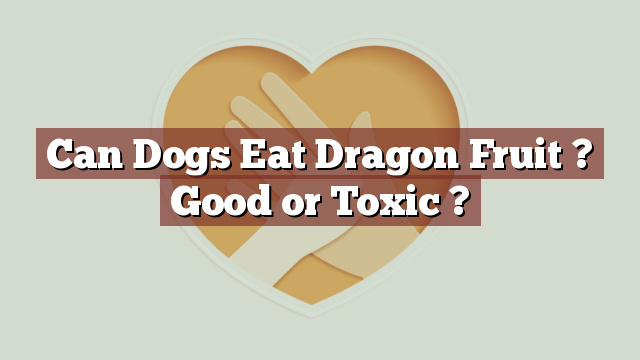Can Dogs Eat Dragon Fruit? Good or Toxic?
It is important for pet owners to be aware of what foods are safe for their furry friends. Can dogs eat dragon fruit? Let’s find out if this exotic fruit is suitable for our canine companions.
Nutritional Value of Dragon Fruit: A Detailed Analysis
Before delving into the question of whether dogs can consume dragon fruit, it is essential to understand the nutritional value of this vibrant fruit. Dragon fruit, also known as pitaya, is packed with various beneficial components. It is a rich source of vitamins such as vitamin C, vitamin B6, and vitamin E. Additionally, dragon fruit contains minerals like iron, calcium, and magnesium. It is also low in calories and high in fiber, making it a favorable choice for humans seeking a healthy snack option.
Can Dogs Eat Dragon Fruit? Evaluating Safety and Toxicity
Can dogs eat dragon fruit? The answer is yes, dogs can consume dragon fruit safely. This tropical fruit is non-toxic and poses no immediate threat to our canine companions. While it is always important to exercise moderation when introducing new foods into a dog’s diet, there is no scientific evidence to suggest that dragon fruit is harmful to dogs.
Veterinary experts have indicated that dragon fruit can be a nutritious addition to a dog’s diet, as it offers a range of vitamins and minerals beneficial for their overall health. However, it is crucial to remember that dragon fruit should only be given to dogs in moderation and as an occasional treat, rather than a staple food.
Potential Risks and Benefits of Feeding Dragon Fruit to Dogs
Feeding dragon fruit to dogs can bring about potential benefits. The vitamins and minerals found in dragon fruit can support a dog’s immune system, improve their skin and coat health, and aid in digestion due to its fiber content. However, it is important to monitor the dog’s reaction to the fruit, as some dogs may have a sensitive stomach and could experience gastrointestinal issues such as diarrhea or upset stomach if they consume too much dragon fruit.
While dragon fruit is generally safe for dogs, it is essential to remove the skin and seeds before offering it to them. The skin can be difficult to digest and may cause discomfort or blockages in the digestive system. Additionally, the seeds can pose a choking hazard or cause obstruction in the gastrointestinal tract.
What to Do If Your Dog Eats Dragon Fruit: Step-by-Step Guide
If your dog accidentally consumes dragon fruit or if you suspect they have eaten too much of it, here is a step-by-step guide on what to do:
- Assess the situation: Determine the quantity of dragon fruit your dog has ingested and observe their behavior for any signs of discomfort or distress.
- Monitor your dog: Keep an eye on your dog for any adverse reactions such as diarrhea, vomiting, or changes in appetite.
- Contact your veterinarian: If you notice any concerning symptoms or if your dog has consumed a large amount of dragon fruit, consult your veterinarian for guidance and advice.
- Adjust their diet: If your dog experiences any digestive issues, consider adjusting their diet and omitting dragon fruit until their stomach settles.
Conclusion: Dragon Fruit as a Safe and Healthy Treat for Dogs
In conclusion, dragon fruit can indeed be a safe and healthy treat for dogs. It offers a range of beneficial vitamins and minerals that can support their overall well-being. However, it is crucial to remember that moderation is key when introducing new foods into a dog’s diet, including dragon fruit. Always remove the skin and seeds, and if you have any concerns or if your dog experiences any adverse reactions, consult your veterinarian for professional advice.
Thank you for investing your time in exploring [page_title] on Can-Eat.org. Our goal is to provide readers like you with thorough and reliable information about various dietary topics. Each article, including [page_title], stems from diligent research and a passion for understanding the nuances of our food choices. We believe that knowledge is a vital step towards making informed and healthy decisions. However, while "[page_title]" sheds light on its specific topic, it's crucial to remember that everyone's body reacts differently to foods and dietary changes. What might be beneficial for one person could have different effects on another. Before you consider integrating suggestions or insights from "[page_title]" into your diet, it's always wise to consult with a nutritionist or healthcare professional. Their specialized knowledge ensures that you're making choices best suited to your individual health needs. As you navigate [page_title], be mindful of potential allergies, intolerances, or unique dietary requirements you may have. No singular article can capture the vast diversity of human health, and individualized guidance is invaluable. The content provided in [page_title] serves as a general guide. It is not, by any means, a substitute for personalized medical or nutritional advice. Your health should always be the top priority, and professional guidance is the best path forward. In your journey towards a balanced and nutritious lifestyle, we hope that [page_title] serves as a helpful stepping stone. Remember, informed decisions lead to healthier outcomes. Thank you for trusting Can-Eat.org. Continue exploring, learning, and prioritizing your health. Cheers to a well-informed and healthier future!

